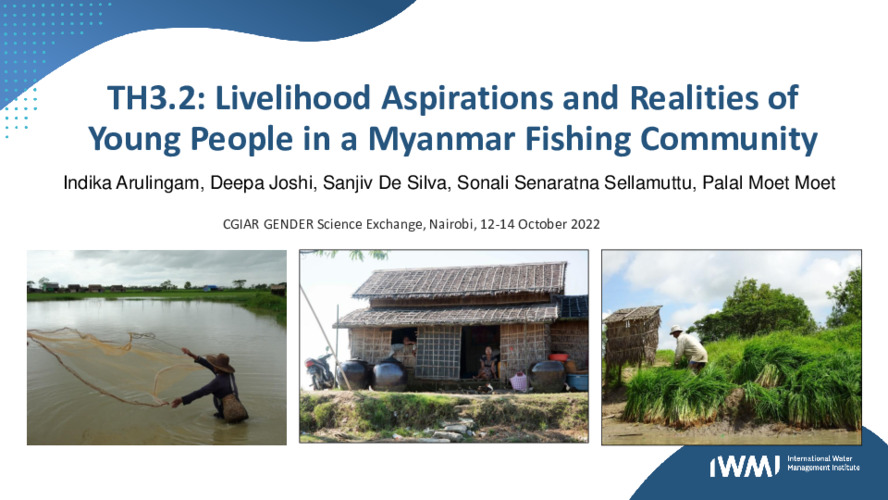Please use this identifier to cite or link to this item:
https://hdl.handle.net/20.500.12348/5449
TH3.2: Livelihood Aspirations and Realities of Young People in a Myanmar Fishing Community
| dc.creator | Arulingam, I. | en_US |
| dc.creator | Joshi, D. | en_US |
| dc.creator | De Silva, S. | en_US |
| dc.creator | Senaratna Sellamuttu, S. | en_US |
| dc.creator | Moet, P.M. | en_US |
| dc.date.accessioned | 2023-02-08T12:51:20Z | |
| dc.date.available | 2023-02-08T12:51:20Z | |
| dc.date.issued | 2022 | en_US |
| dc.identifier.citation | Arulingam, Indika; Joshi, Deepa; Silva, Sanjiv de; Sellamuttu, Sonali Senaratna; Moet, Palal Moet. 2022. Livelihood Aspirations and Realities of Young People in a Myanmar Fishing Community. Presented a the CGIAR GENDER Science Exchange, Nairobi, 12-14 October 2022. Colombo, Sri Lanka: International Water Management Institute. | en_US |
| dc.identifier.uri | https://hdl.handle.net/20.500.12348/5449 | |
| dc.description.abstract | Youth livelihoods in food-systems are increasingly the focus of development institutions, drawing attention to how the livelihood aspirations of young people shape their engagements with food-systems. This study sought to understand the livelihood aspirations of young people from a historically poor and marginalized fishing community in the Ayeyarwady Delta of Myanmar, and how these aspirations shaped livelihood realities. Data collection was through focus group discussions (seven FGDs) and semi-structured interviews with youth and other household members, from fisher households and others in the village (73 interviews, including 15 female youth 13 male youth from fisher households). For these youth, the political and economic transitions experienced by Myanmar in the last decade offered aspirations for new desired futures, beyond those associated with poverty and marginalization. However, for many of these young people, due to the realities of their socio-economic and gendered positioning, aspiring did not involve a straightforward navigation towards futures that were strictly defined. Instead, their aspirations remained broad and vague, and concretized, on strongly gendered terms, based on opportunities encountered in the present. Therefore, while few of their livelihood realities aligned with these desired futures, in a changing environment considered synonymous with progress, these engagements were marked by a sense of temporariness, and a looking to the future for better opportunities to emerge. The study contributes to the growing recognition that the livelihood engagements of many young people and their intersections with food-systems are not marked by complete arrivals or departures, but by a moving in and out of multiple geographies and sectors. | en_US |
| dc.format | en_US | |
| dc.language | en | en_US |
| dc.publisher | International Water Management Institute (IWMI) | en_US |
| dc.rights | CC-BY-4.0 | en_US |
| dc.subject | no poverty | en_US |
| dc.subject | zero hunger | en_US |
| dc.subject | life below water | en_US |
| dc.subject | poverty reduction, livelihoods and jobs | en_US |
| dc.subject | gender equality, youth and social inclusion | en_US |
| dc.title | TH3.2: Livelihood Aspirations and Realities of Young People in a Myanmar Fishing Community | en_US |
| dc.type | Presentation | en_US |
| cg.contributor.funder | International Fund for Agricultural Development | en_US |
| cg.contributor.funder | CGIAR Gender Platform | en_US |
| cg.coverage.country | Myanmar | en_US |
| cg.coverage.region | South-Eastern Asia | en_US |
| cg.subject.agrovoc | agriculture | en_US |
| cg.subject.agrovoc | gender | en_US |
| cg.subject.agrovoc | Fish | en_US |
| cg.contributor.affiliation | International Water Management Institute | en_US |
| cg.contributor.affiliation | Coventry University, Centre for Agroecology, Water and Resilience | en_US |
| cg.identifier.status | Open access | en_US |
| cg.description.theme | Miscellaneous themes | en_US |
| cg.description.theme | Resilient small-scale fisheries | en_US |
| cg.identifier.url | https://cgspace.cgiar.org/handle/10568/125588 | en_US |
| cg.creator.id | Indika Arulingam: 0000-0002-6995-238X | en_US |
Files in this item
This item appears in the following Collection(s)
-
Miscellaneous themes [906]
-
Resilient small-scale fisheries [1337]
